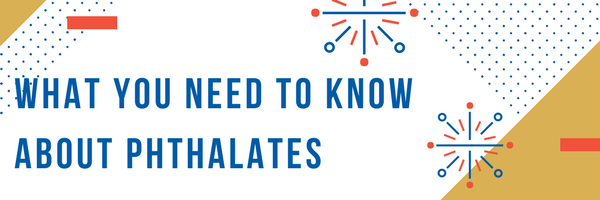What You Need to Know About Phthalates
Some years back, BPA (a type of plastic), earned a bad name as a health disruptor. The market responded by slapping a ‘BPA free’ label wherever it could, and often just replaced BPA (bisphenol A) for BPS (bisphenol S), which has the same estrogen-like compounds.
While it was great that consumer awareness about plastics began at this time, and it also was great that many consumers started using glass and steel containers, I would not say that we, as a culture, got a deep and clear understanding of synthetic ingredients following the BPA uproar.
Let's Learn About Phthalates
So let’s continue our education and add another ‘bad plastic’ to the list: phthalates. Phthalates is a hard word to pronounce ( say “thal - lates” ) and even harder to spell, but I want you to get to know this group of chemicals, as they are probably more ubiquitous than BPA, and a lack of awareness is leaving you literally soaking in a sea of phthalates.
Phthalates keep plastic soft- like in those disposable, pre-filled water bottles, plastic hoses, plastic wrap, even IV bags in hospitals. But that’s not all phthalates do. They also help keep fragrance lingering for longer, so they are a part of about every ‘fragrance’ mix you see on a label.
Large companies are now pumping fragrance around their buildings as a signature scent. Hotels are doing it, and even Goodwill Industries has gotten into it. But I digress…
The Problem with Phthalates
The problem with phthalates is that they are obesogens and endocrine disruptors. This means that they contribute to a toxic load that can make you fat, tired and grumpy. They can also contribute to fertility issues and man boobs.
The tricky thing about environmental toxins is that we are all exposed to multiple toxins from multiple sources, so it becomes difficult to isolate any one source as the cause of disease.
However, there is a growing body of study linking phthalates and other chemicals to health disorders, especially in unborn and small children:
Early Prenatal Phthalate Exposure, Sex Steroid Hormones, and Birth Outcomes.
Are We Being Protected?
According to the FDA, the higher levels of phthalate metabolites now found in urinary testing cannot be tied to symptom development. (Example of testing of phthalate levels)
“While the CDC report noted elevated levels of phthalates excreted by women of child-bearing age, neither this report nor the other data reviewed by FDA established an association between the use of phthalates in cosmetic products and a health risk. Based on this information, FDA determined that there wasn’t a sound, scientific basis to support taking regulatory action against cosmetics containing phthalates.” (source)
It appears this information has not been reviewed since 2002. However, I did find an article that stated that, in 2016, the FDA was going to reconsider the use of phthalates in food packaging and equipment (source), but I have not seen any further reference to their response to this public petition.
What Can You Do?
As I mentioned earlier, we all have multiple exposures to chemicals in our modern world. But we can reduce our exposure significantly through our own choices! Most of those choices are made in what we buy to eat and use around the home. If you want to avoid phthalates, here are some easy tips:
Avoid buying those pre-filled soft water bottles. Instead, invest in a home water filter and keep glass bottles of filtered water ready to go when headed out of the house.
Eat organic as much as possible. Phthalates are part of some pesticides.
Avoid processed foods wrapped in plastic like pre-made burgers. Also, store your food in glass- not plastic.
If you don't need your receipt, ask the sales clerk to throw it out for you.
Don’t get your nails done. Nail salons are so full of chemicals! Just buff, trim and oil your nails to keep them healthy.
Make your own air freshener. This is super easy and avoids phthalates. I have a video on it here.
If you visit a place with a troubling amount of fragrance, comment! I just wrote my local Goodwill Industries and cited some sources!
Avoid the word ‘fragrance’ like the plague. Instead, buy unscented or items scented with essential oils. Be careful, because everything from kitty litter to trash bags is now being scented.
Learn more. This is a huge topic but little by little you become an expert!
Favorite Resources
1. Watch the Webinar: Choosing the Best Products for Your Skin Type
In this free webinar recording we will spend a little time talking about why Beautycounter is different in terms of product quality (both non-toxic and high performance) and then we'll focus on their skincare lines to help you choose a good, non-toxic line up for your skin type.
I chose to work with Beautycounter as it allows me to recommend high-performing, safer products online. You can browse our Beautycounter store here.
2. Read some of my other posts about Detoxing from Chemicals
How to find a non-toxic deodorant that works
3. Get My Free Download: 5 Easy Detox Swaps
Are you doing all the ‘right things’ but still feeling blah?
Get my list of 5 Easy Detox Swaps for Women’s Health to start clearing out the toxins and reset your system to feel better today!
What are your experiences with phthalates? Do you try to avoid them?
Bridgit Danner, LAc, FDNP, is trained in functional health coaching and has worked with thousands of women over her career since 2004. She is the founder of Women’s Wellness Collaborative llc and HormoneDetoxShop.com.




